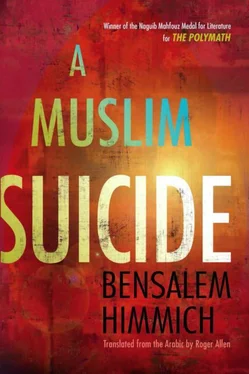All of a sudden I stopped talking, and the students likewise stopped taking it all down. I waited for a few moments, assuming that they would ask me some questions and that would give me some idea about the extent to which they were responding and understanding. I would have convinced myself that I was shouting in the desert and beating a drum under water, had not a beardless youth stood up and asked to address a question to me.
"Master," he asked, "do you include poets in the group of people, dead and alive, about whom you have been talking?"
"Only as individuals," I replied, "and in accordance with their talent and reputation. Like all other groups, poets fit into different groups and classes rather than belonging to a single class or school of thought. People are classified by their actions and what they leave behind. Those are the only criteria that can serve as testimony either for or against them. That is God's law when it comes to His creation, and you'll never find any substitute for it."
The young man was silent for a moment, but then he started reciting a number of lines of poetry from the poetic heritage of the Arabs; the majority were by Ibn al-Mu`tazz.* I was amazed at his ability to memorize so much and to recall things with such conviction. I asked him why he was so fond of memorizing poetry, and he responded that he wished to become a poet himself. I then asked him why he liked Ibn al-Mu'tazz's poetry so much, and he told me it was because of the gentle quality of his verse and its accessibility. I complimented him on his craft and encouraged him to continue with his quest.
The other students were following this conversation between myself and their colleague who had memorized so much poetry with considerable interest.
"In olden times," I told them all, "a minor poet was someone who had memorized two thousand lines of poetry, while a real poet was supposed to have memorized much more than that. Major poets would have memorized the entire corpus of Arabic poetry. But you have to realize that mere memorization by itself is pointless and fruitless. In his poetry the poet has to be able to use his verses to enhance both intellect and feeling, at the same time giving the listener a good deal of pleasure and imbuing his best verses with his inner feelings and attitudes to life. He will then be able to endow the essence of his verse with qualities that will help avoid the kind of harmful frivolity that only manages to see everything the same way and destroy it. The quotation that you cited is actually borrowed from Abu Hayyan al-Tawhidi (may God perfume his memory!): `The best discourse is that whose phraseology is delicate, whose imagery is refined, and whose beauty glistens. In the context of poetry it should seem like prose; in that of prose, it should seem like poetry."'
Another student asked to speak, and I was delighted to allow him to do so.
"Master," he said, "I'm sure you are the kind of person who wants to see a question thoroughly explored. I have sat here listening as this student, Muhammad al-Zayyani, has recited some of Ibn al-Mu'tazz's verses about nature and similar topics. But he hasn't included even a single verse of the poet's obscene poetry! What do you have to say about such poetry and its author?"
"I assume," I replied by way of teasing my interlocutor, "that you have studied such poetry and the life of its author carefully?"
"No, Sir," he said, "I can't possibly do that. As we say in Bijaya, `You can tell what kind of house it is by the doorway."'
"But you should understand that a text has to be understood before you can pass judgment on it; that's a generally applicable principle. In any case, it's quite acceptable to utter a prayer for forgiveness. Now one thing that you all should know from the outset is that our poet, who was called `prince of day and night,' was murdered by his servant, Mu'nis, and his colleagues who were palace pages. I will not conceal from any of you that, when I was young, I spent a lot of time reading Ibn al-Mu`tazz's poetry, which is highly accessible and an interesting blend of ancient and modern. That was one way in which I was able to enhance my own linguistic abilities. As I perused one poem after another, it became clear to me that this poet had made the most of his personal observation and indeed his own trials and tribulations until the Abbasid caliphate went into a decline, which would inevitably lead to a dire conclusion-one of the features of which became fairly obvious to him in not only the murder of his grandfather, al-Mutawakkil, and the deposition of his own father, al-Mu'tazz, but also in the increasing domination of the Turkish soldiery and their slaves. This poet-caliph, Ibn al-Mu'tazz, clearly did not like what he was seeing, and so early in life he decided to conduct himself in a way that ruined his possibilities as a political force and created an unbreachable chasm between himself and his right to the caliphal succession. The method he employed in order to register the clearest possible proof of his lack of leadership ability and political acumen was a truly debauched kind of Epicureanism and an ongoing quest for pleasures, both public and private. That applied to his conduct not merely in daily life, but also in his literary interests, in that he studied the poetry of his era in his book Tabagat al-shu`ara' [The Classes of Poets], and also wrote Al-Jami`fi al-ghina' li-adab al-khamr wa-al-sharab [The Comprehensive Study of Lyrical Poetry on Wine and Drinking]. It was almost as though the poet had decided to divert his attention away from the constant threat of death all around him by indulging in every conceivable kind of excessively debauched escapade. Then there is the quotation attributed to him: `If I am inevitably going to be killed, then let it happen when I am sitting amongst beauteous singing-girls and things that I relish.' In fact, his murder was of the most violent and atrocious kind: it was said that his testicles were crushed or that he was castrated-it really makes no difference. On the Day of Reckoning, Ibn al-Mu'tazz may well be asked about his life. I can imagine him replying, `I'm no hero; I was forced.' Put another way, it was a matter of compulsion, not choice. Even though I may not have been happy about the way I behaved, I would still be unwilling to allow myself to take the place of the One who alone can pass judgment-He who is both Forgiving and Merciful. I would make do with uttering a prayer that Ibn al-Mu'tazz might receive his due share of pardon and forgiveness, like Abu Nuwas,* Ibn Sina,* `Umar al-Khayyam,* and other sinners and reprobates. As God himself states in the Sura of Woman [Sura 4], `God does not forgive those who associate anything with Him. But He will forgive anyone whom He wishes for offenses other than that."'
I could not help thinking about the other things that Ibn al-Mu'tazz had said that I had omitted from my statement to the students: "I only composed poetry on the side; I never touched the daughter of the grape; I only consorted with women during my reckless youth when I spoke of passion-all that without any degree of exaggeration or addiction."
At this point a third student asked me for my opinion of Al-Shushtari's poetry.
"As you well know," I said, "our beloved companion Abu al-Hasan's poetry consists of some poems in colloquial dialect, and others in standard written Arabic. Neither language nor meter is complex, and they flow nicely. They stand liberated from the dictates of the rules of Sibawayh's* and Al-Khalil's* systems, and that allows them to seem both smooth and more pleasing. The imagery that he uses in his compositions is transparent and lucid in its effect and shows an excellent technique and accomplishment. The creative and attractive method that he adopts, the discourse shaped by circumstance and hard work, the unique ability to combine both aspiration toward the exalted beyond and a practical anchoredness in the world of mankind, all these qualities make me feel at one with the poetry since it responds to a natural urge within me and thus has a very positive impact. That feeling is even intensified when Abu al-Hasan invokes instinct and surmise to depict things that I find myself needing to formulate through prolonged examination and creative thought, namely the absolute oneness of existence and the process whereby the created entity rises to greater heights through a quest for perfection and a closeness to the Creator, who is no other than God Himself. How can I stop my entire inner self from catching fire and being inspired when I read lines from a zajal like these in Andalusian dialect:
Читать дальше












